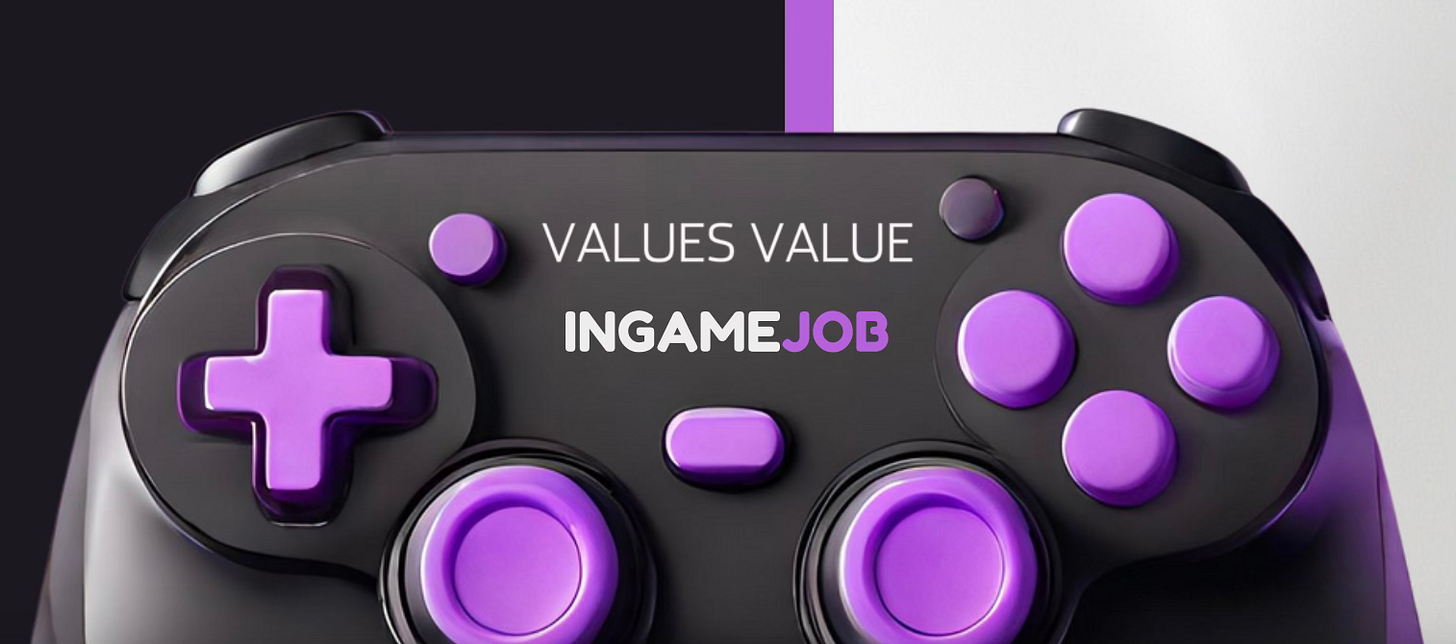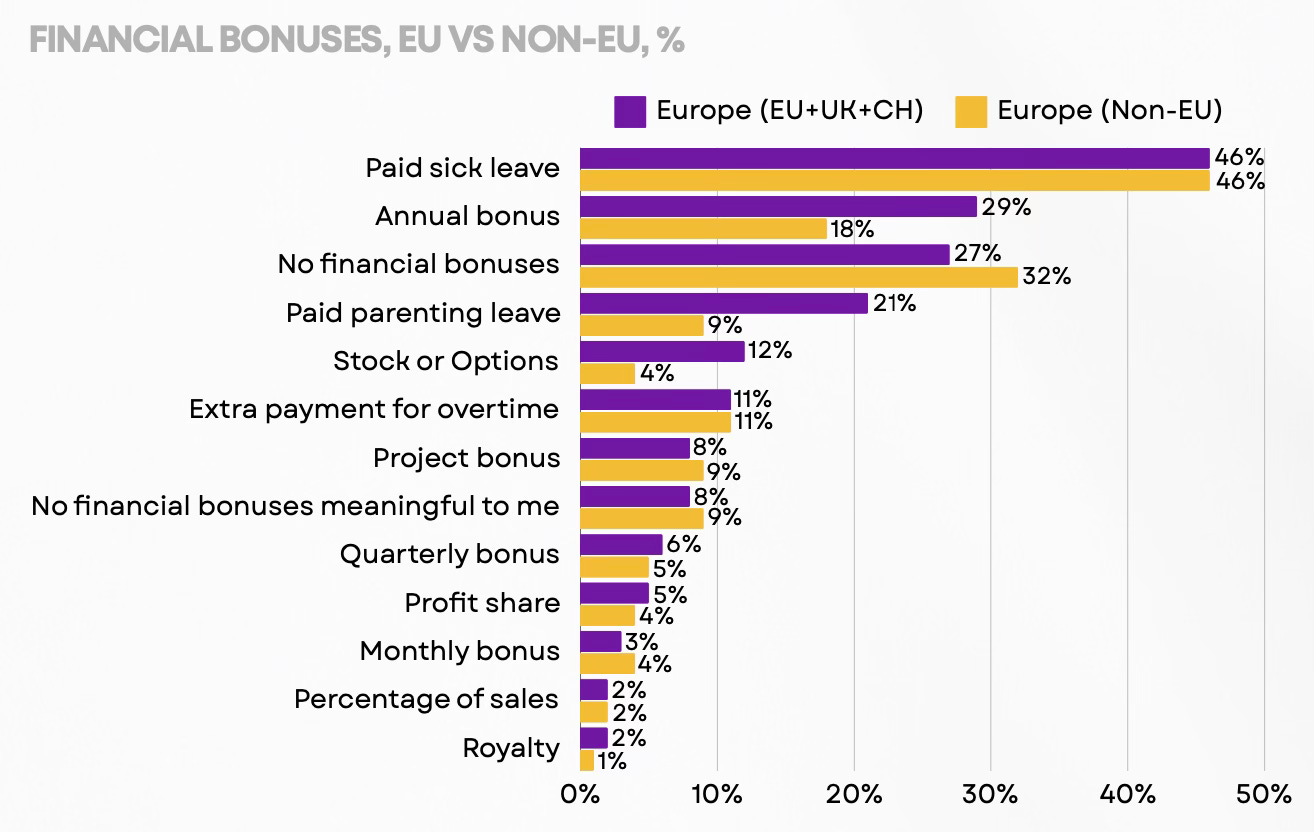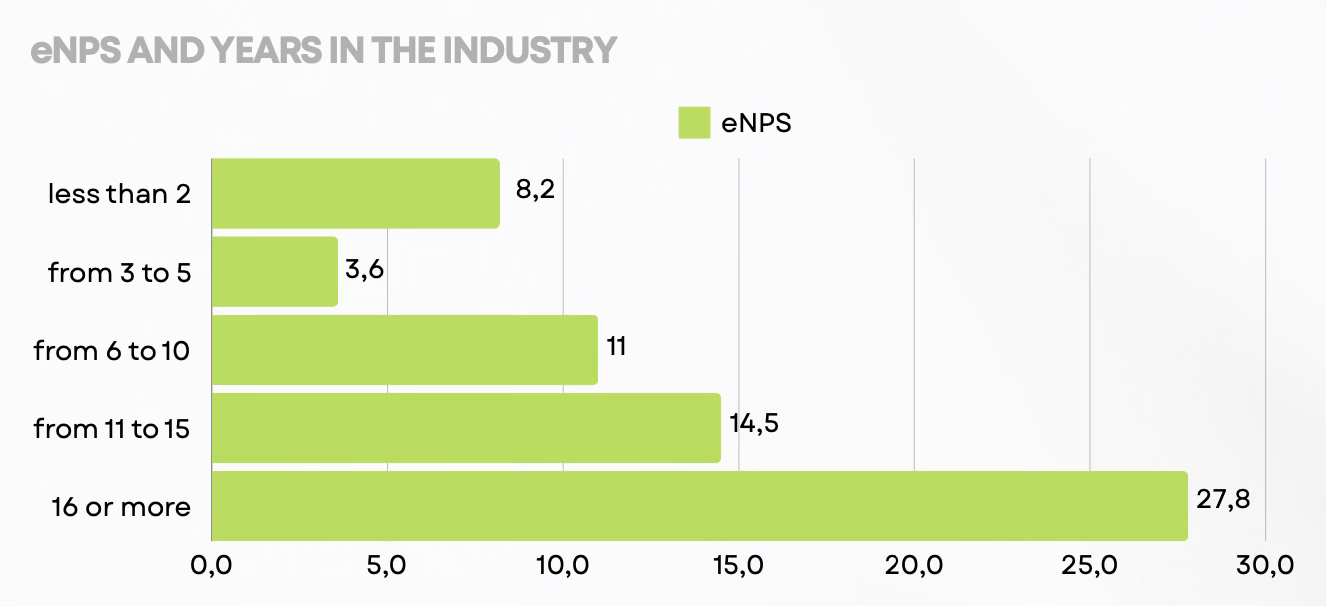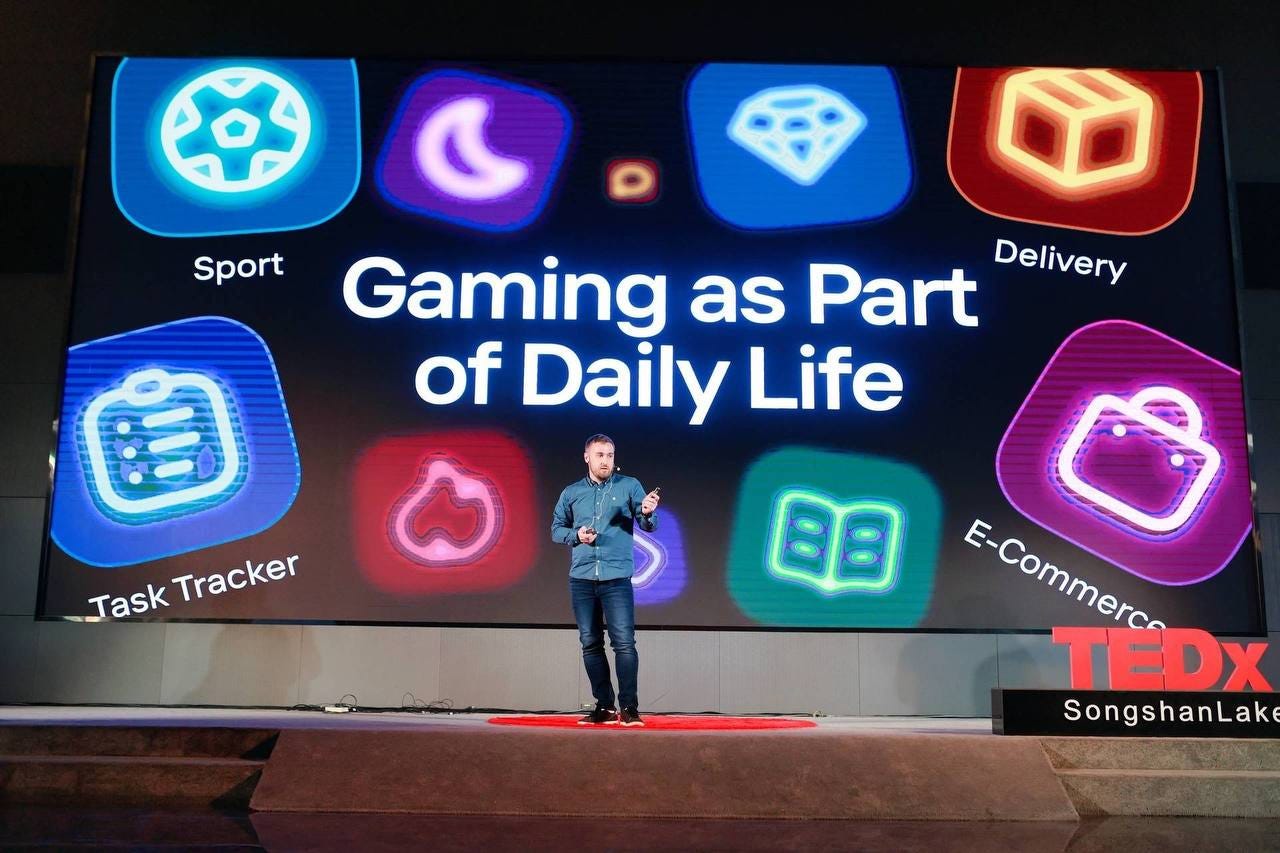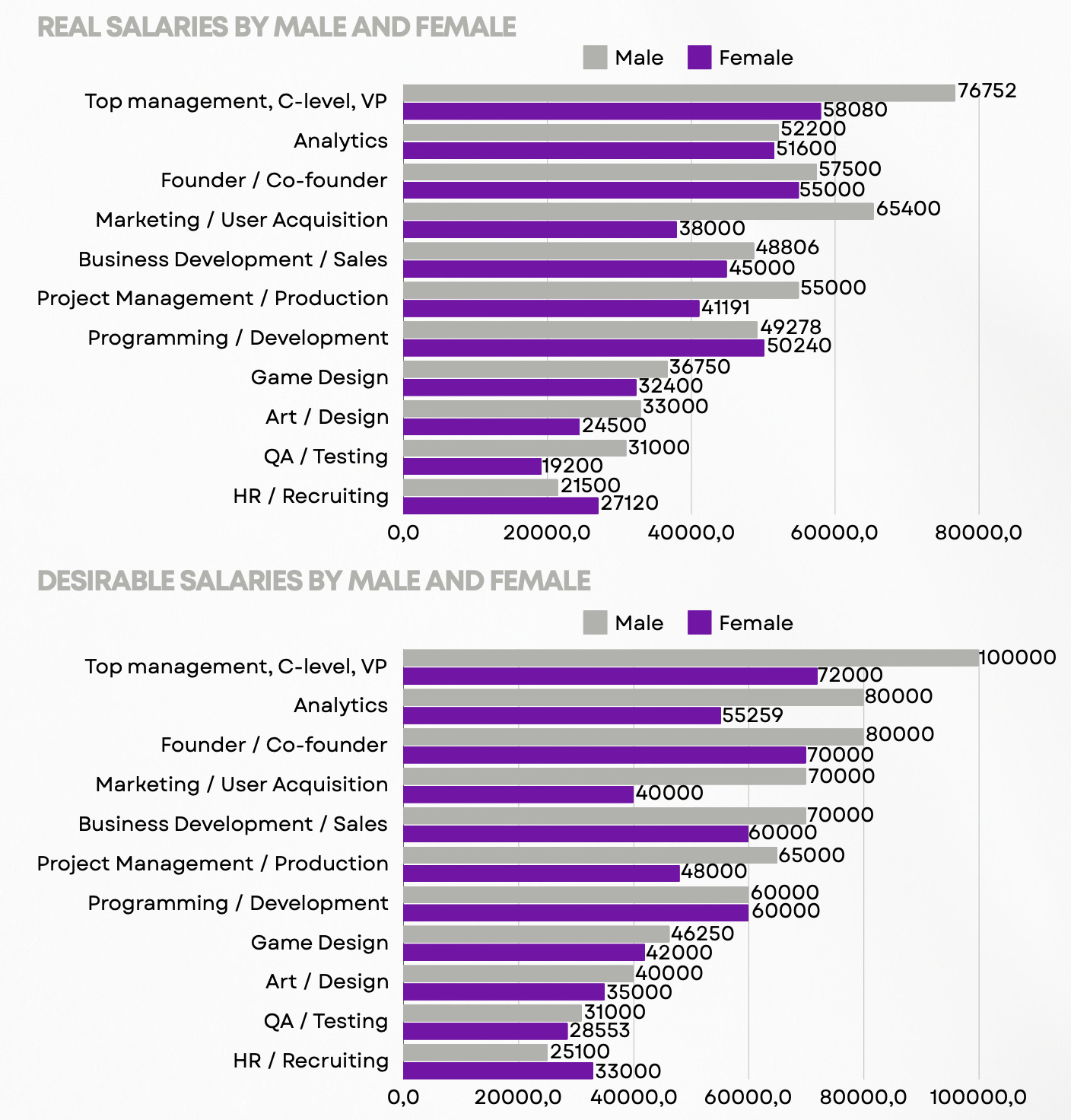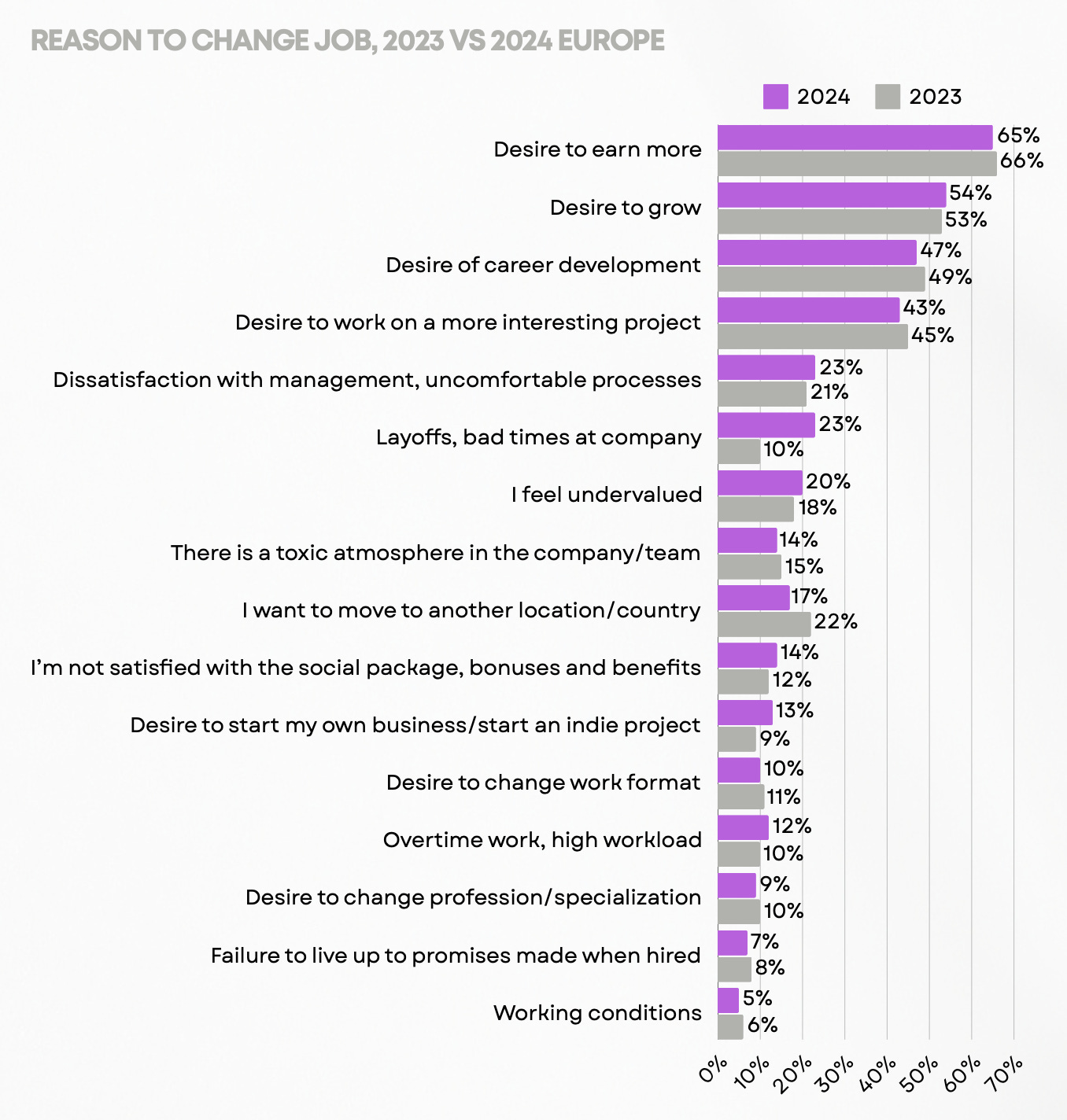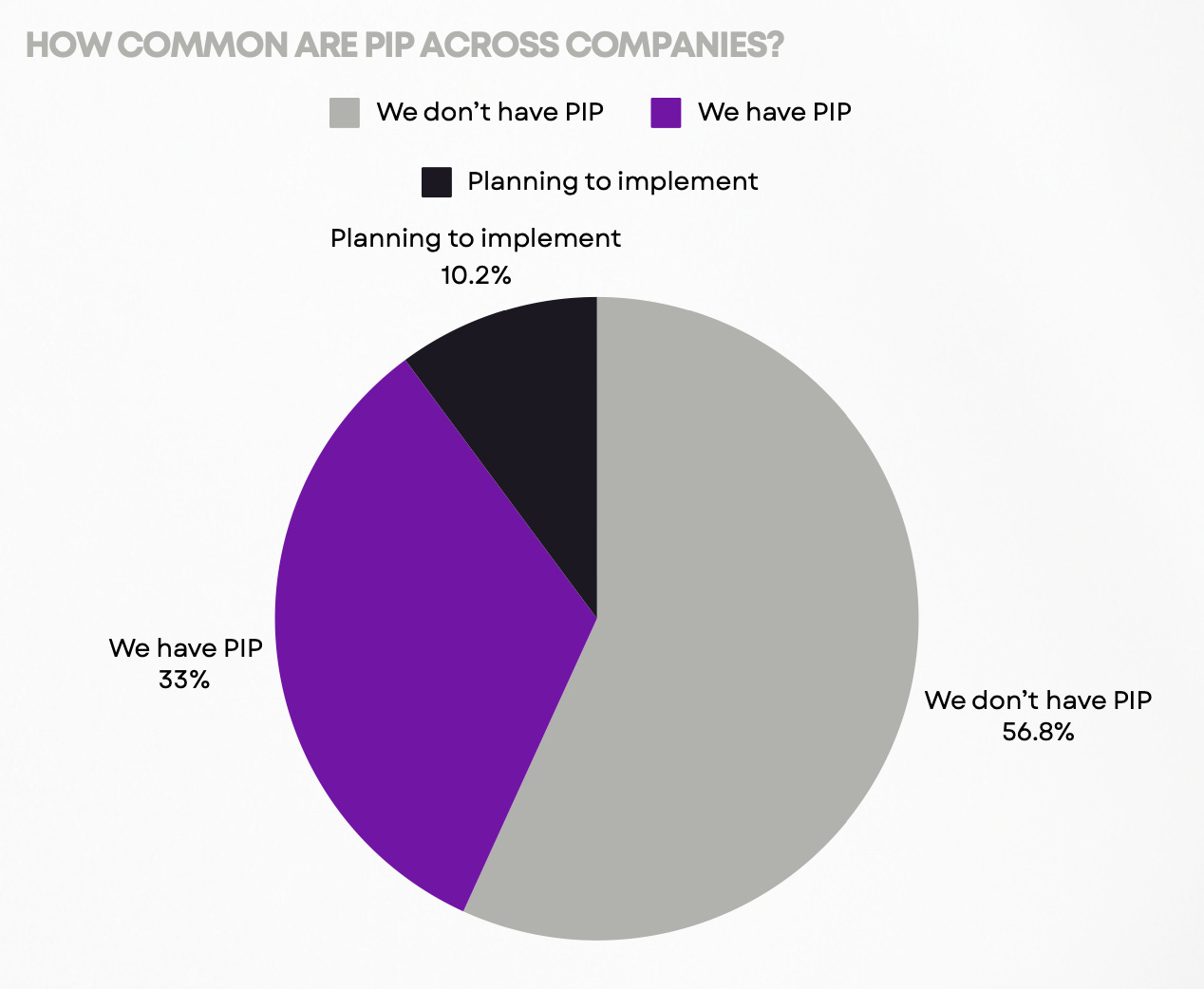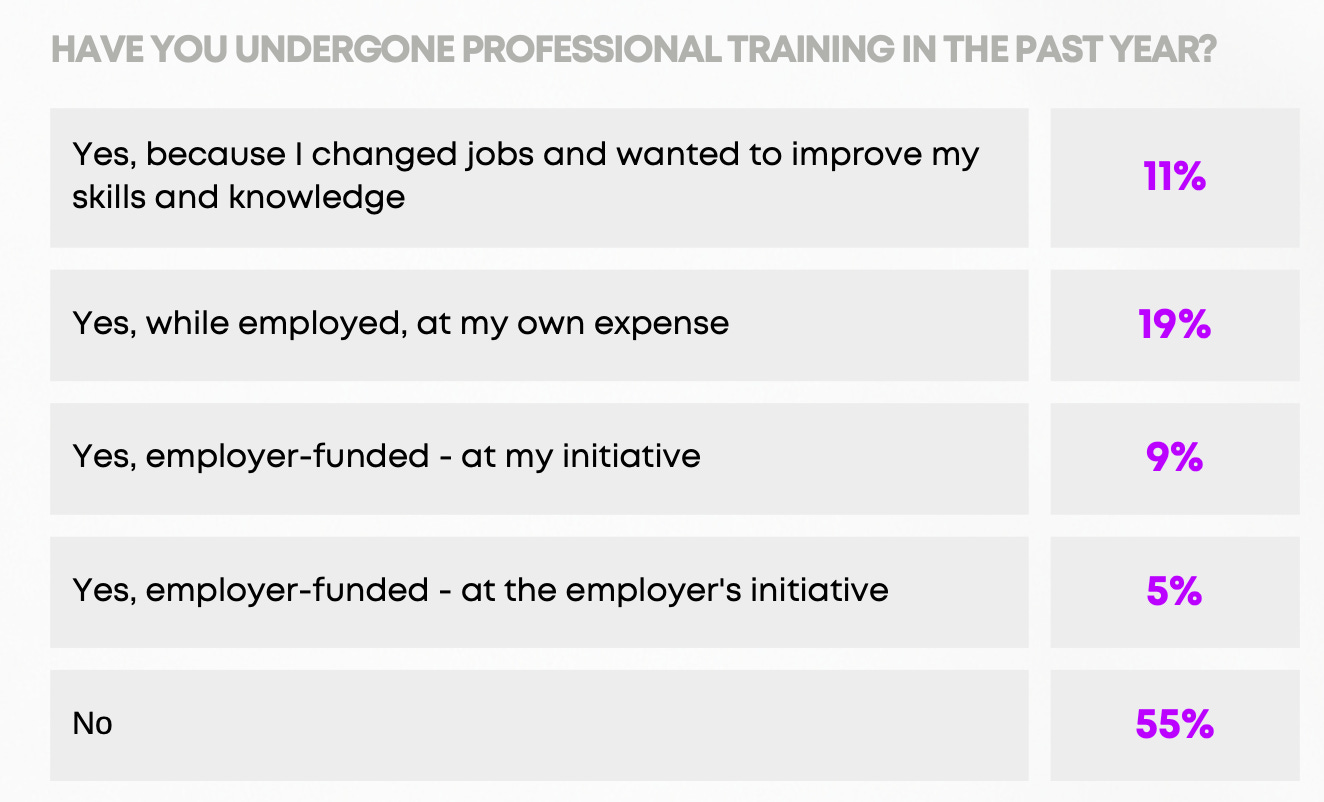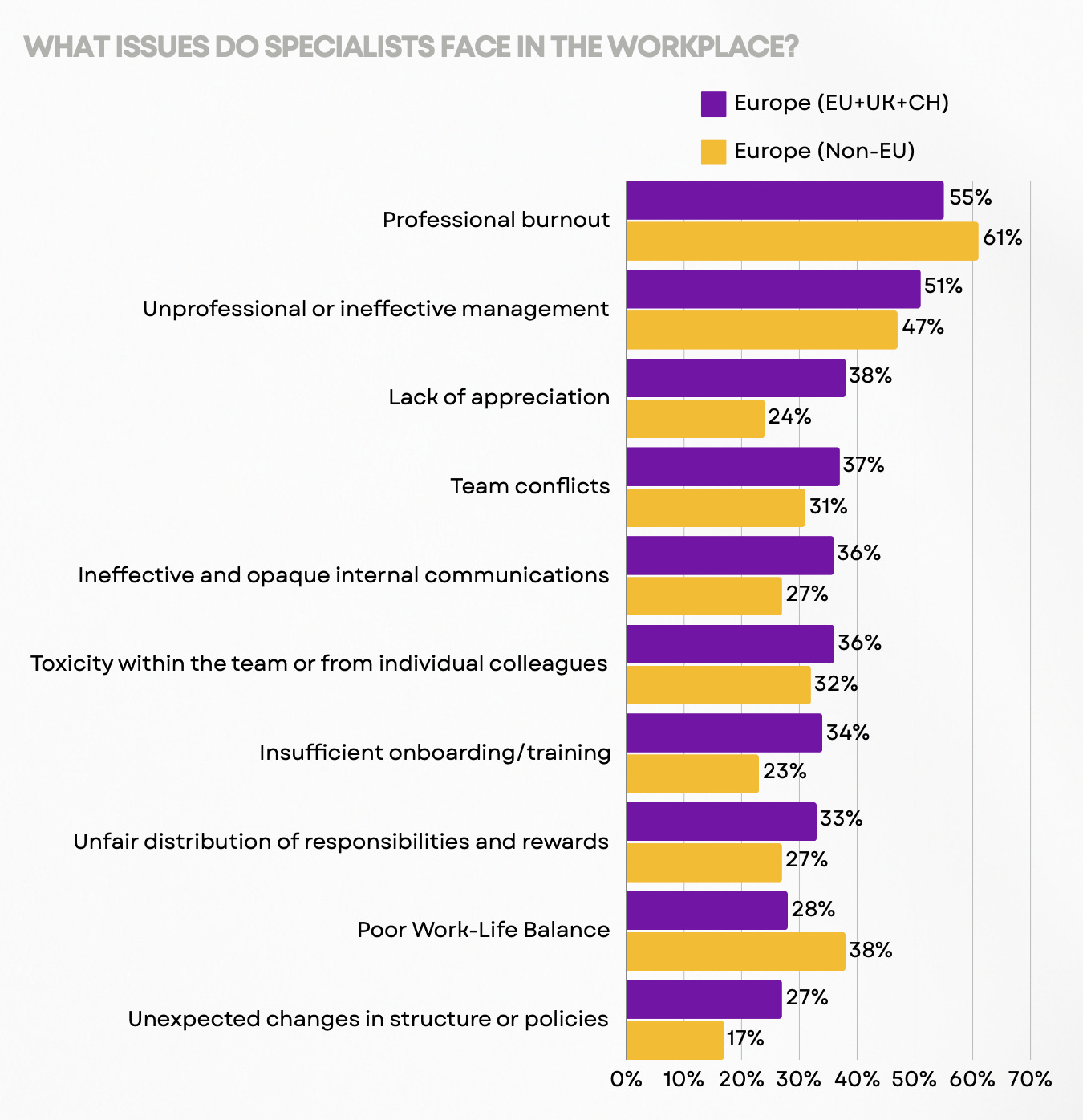Values Value & inGameJob: European Gaming Job Market in 2024
Salaries increased a little; a third of Junior specialists decided to quit the gaming industry after struggling to find a new job.
The survey involved 1,832 people from March to June 2024. The research regions were divided into two parts. The first included countries of the European Union, the United Kingdom, and Switzerland (for simplicity, I’ll name them the EU). The second included European countries not in the EU (I’ll name them as non-EU). More men participated in the survey (58%); the distribution by position level is even. 19% have over 10 years of experience in games.
Salaries
The median annual gross salary for Senior specialists ranges from €31,000 to €84,000 per year. QA and testing specialists earn the least; top management earns the most.
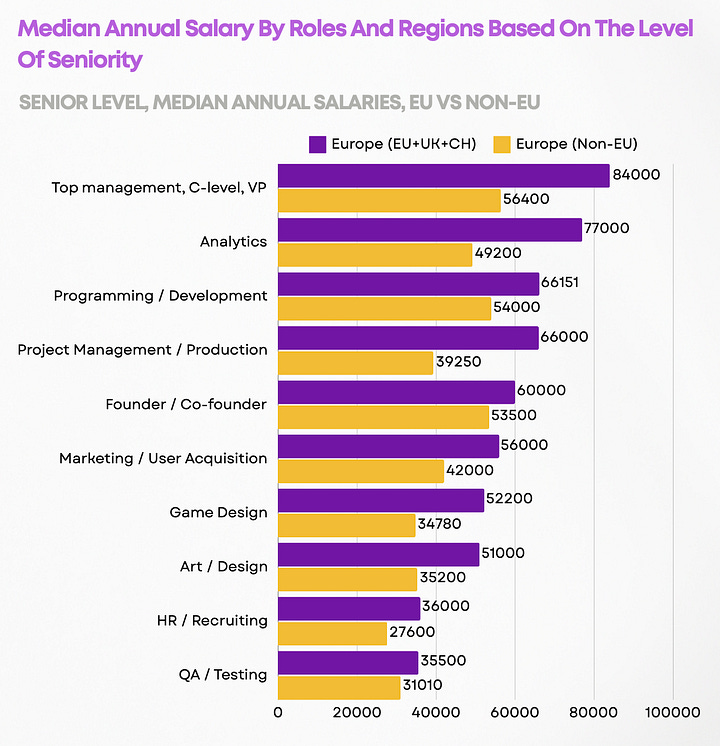

For mid-level specialists, the salary ranges from €13,800 to €47,000 per year. Again, QA and testing specialists are paid the least, while programmers have the highest salaries.
The median salary for Junior specialists ranges from €6,700 to €24,250 per year. Game designers from non-EU European countries earn the least. Programmers in EU countries, the UK, and Switzerland earn the most.




The median salary in 2024 increased for all specialties except HR and recruitment, QA and testing, and project management specialists. In EU countries (+ UK and Switzerland), salaries also decreased for sound specialists and artists. In non-EU European countries, game designers' salaries also decreased.
There is a noticeable decrease in salaries for almost all entry-level positions.



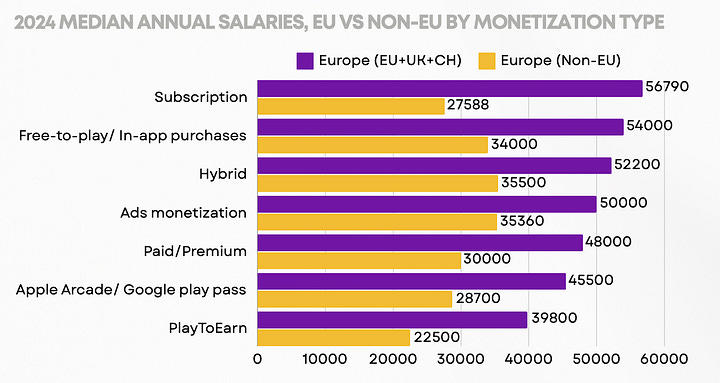
Specialists working in mobile game studios, on average, earn more than their colleagues in premium game development.
Job and Salary Satisfaction
Regarding financial bonuses, only 46% of companies offer paid sick leave; 29% of EU companies offer an annual bonus (only 18% among non-EU companies). Paid parental leave is available in 21% of EU companies and 9% of non-EU companies.
The highest satisfaction comes from (in descending order) - revenue share, sales percentage, royalties, project bonus, and additional overtime pay.
Almost half of the companies offer health insurance; corporate events are held by 33% of EU companies and 24% of non-EU companies. Non-EU companies stand out with holiday gifts for colleagues (24%) and tax compensation for contractors and self-employed (20%).
There's a pattern - the longer a person works in the industry, the less likely they are to change jobs. Professionals who have been in the industry for more than 6 years are more loyal to their employers.
The highest employee satisfaction with their workplace is in service companies by a large margin. Publishers and product companies, outsourcers follow. The lowest level of satisfaction is among indie developers and developers collaborating with publishers.
❗️Satisfaction with the workplace has decreased in product companies. This is likely due to the market crisis.
People's attitudes towards overtime have changed. In 2024, they are more tolerant of overtime 1-2 times a week. This is the point after which workplace satisfaction significantly decreases.
Employees feel best in large companies with more than 500 people. The worst - in small teams of 11-50 people.
Only remote or only office work format doesn't make people happier. But a hybrid format does.
When considering non-material bonuses that affect people's happiness, the leaders are - excellent technical support, payment for conference participation, interest-free loans, the possibility of taking a sabbatical, corporate apartments or flats.
The most satisfied employees are among those working on hardcore and midcore projects in large studios. The most dissatisfied are among indie developers.
Employees who have their pet projects are less loyal and engaged with their employers.
My dear friend Ilya Gutov started Meridian Play - a Gaming Corporate Advisory and Game Accelerator firm focused on fostering cross-border partnerships in the gaming industry between the East and West. Simply put, Ilya is helping developers from the West achieve success in the East. I worked with him, and he knows the ropes. Find more here.
Gender pay gap
Women earn less than men on average. However, female programmers earn more than males, as do HR and recruitment specialists.
Female, on average, wants a lower salary (7% higher than current) than male (54% higher than current).
Corporate work
57% of EU companies and 75% of non-EU companies offer remote work options. Publishers and developers offer the least remote format.
Users' attitudes towards AI are changing significantly. The number of people who use AI at work and find it useful has increased. However, the percentage of people for whom AI is not useful has increased by 1% compared to 2023. Artists/designers and game designers use AI the most.
Job Changes and Layoffs
The lower the classification level, the higher the probability of being laid off - according to employees themselves.


Localization workers, sound specialists, artists, QA specialists, and project management representatives express the greatest concern about their future. People from PR and media worry the least.
Men and women equally assess their risks of being laid off.
55.6% of respondents did not change jobs in the last year. 23.2% changed voluntarily. 15% were laid off and found a new place. 6.2% were laid off and haven't been able to find new work yet.
The main reasons for changing jobs are - desire to earn more (65-66%), desire for professional growth (53-54%), desire for career growth (47-49%), desire to work on more interesting projects (43-45%).
55.2% look for work for up to 3 months; 24.4% - from 3 to 6 months; 12.3% - from 6 months to a year; 8.1% - more than 1 year.
Top managers and people from project/product management spend the least time job searching. QA specialists have the most difficulty.


Junior specialists take the longest to find a job.
Consider subscribing to the GameDev Reports Premium tier to support the newsletter. Get access to the list of curated articles & archive of Gaming Reports that I’ve been collecting since 2020.
A third of Junior specialists left the gaming industry after leaving or being laid off from their current jobs. Among Middle and higher specialists, no more than 11% did so. A quarter of Middle and Senior specialists agreed to a salary reduction.


Physical and Mental Health in the Gaming Industry
33% of gaming companies have employee development plans. 10.2% plan to integrate them.
Product companies, publishers, and non-gaming service companies have the most employee development programs. There is a direct correlation with company size (larger companies have programs).
In companies where employee development systems exist or are planned, employee loyalty and job satisfaction are higher.
Interestingly, top management representatives feel their development best. Juniors, more often than others, feel they are stagnating.


31% of workers work overtime more than once a week. Top management and Junior specialists have the most frequent overtime.
More than a third of employees are okay with overtime if it makes sense. 8% refuse overtime.


55% did not undergo any professional training in the last year. Only 14% of employees had their training paid for by companies.
Most companies don't have inclusivity specialists. More than half of the companies have no such plans.


32% of employees have faced gender discrimination; 26% - age discrimination; 17% - discrimination based on place of birth; 17% - language discrimination.


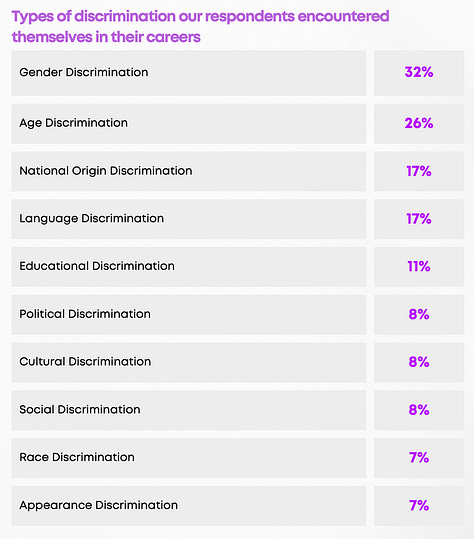
However, half (49%) observed gender discrimination; 34% - age discrimination.
The most important problems for employees in the workplace are burnout (more than half of employees noted this) and unprofessional or ineffective management (half of employees noted this as a problem).
92% of respondents would like to work at CD Projekt RED, 85% - at Larian Studios.



